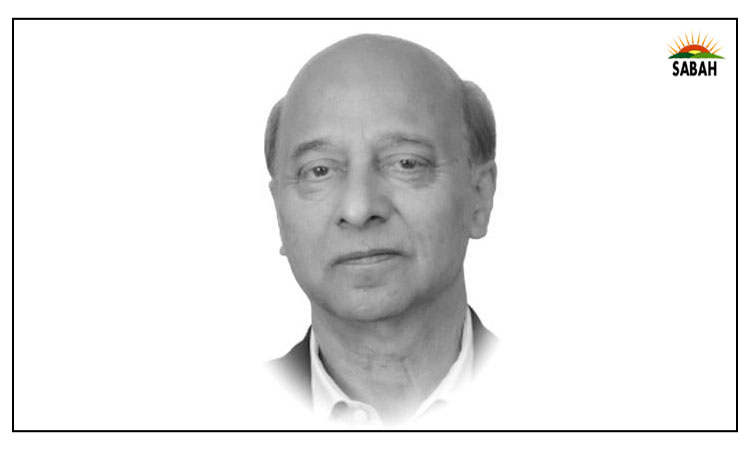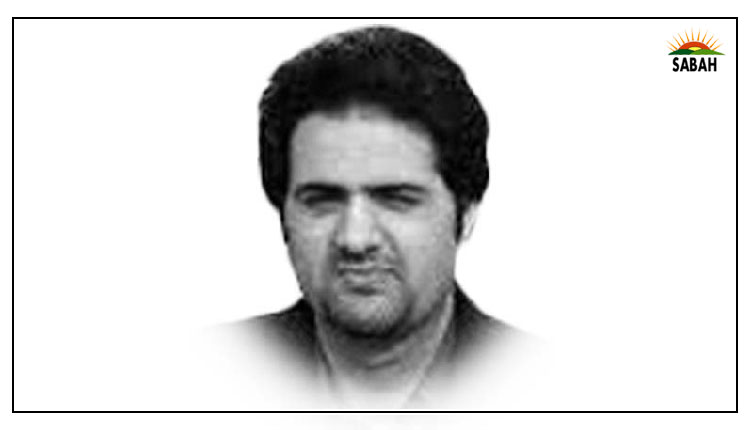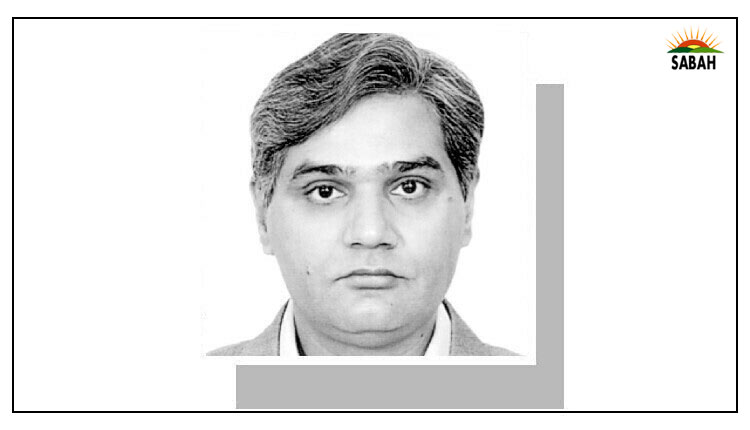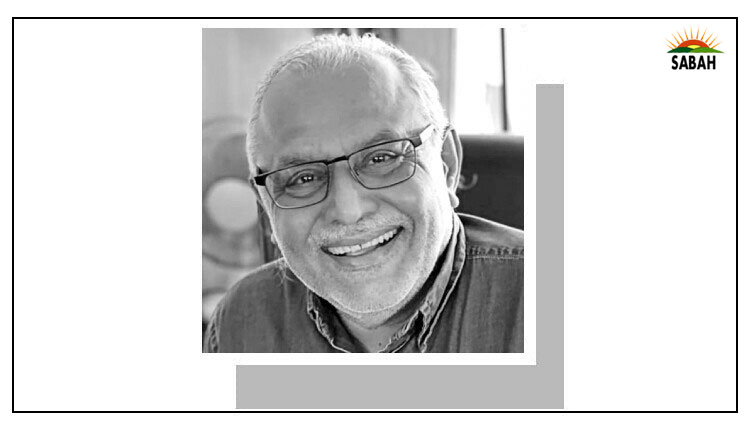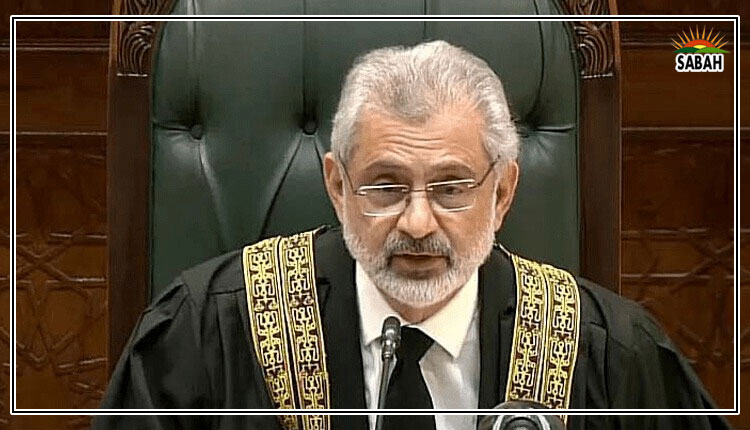CJP Qazi Faez Isa expresses his dismay at the report compiled & submitted by the commission in Faizabad sit-in case
ISLAMABAD, May 06 (SABAH): Chief Justice of Pakistan (CJP) Justice Qazi Faez Isa on Monday expressed his dissatisfaction with the report submitted by an inquiry commission formed to investigate the Tehreek-i-Labbaik Pakistan’s (TLP) 2017 Faizabad sit-in, remarking that the probe body was not even aware of its responsibility.
The top judge’s remarks come as a three-member Supreme Court bench took up a set of review petitions filed against the SC’s 2019 judgment in the Faizabad sit-in case.
The bench — headed by CJP Justice Qazi Faez Isa, and also including Justice Irfan Saadat Khan and Justice Naeem Akhtar Afghan — presided over the hearing on Monday, which was broadcast live on the Supreme Court website and YouTube channel.
During the hearing on Monday, CJP Isa expressed his dismay at the report compiled and submitted by the commission.
CJP Isa inquired whether the AGP Mansoor Usman Awan had seen the report submitted by the Election Commission of Pakistan (ECP), to which the latter replied in the negative. The chief justice then directed the AGP to review the ECP report and gave a break in the hearing.
After the hearing resumed, Justice Isa expressed his indignation over the report.
The attorney general recalled that Gen (retd) Faiz Hameed had told the commission that it was not the Inter-Services Intelligence’s (ISI) responsibility to look into the financial support of terrorists.
“If it’s not their responsibility then whose responsibility is it?” Justice Isa retorted. He questioned what kind of report the commission had made and inquired where the rest of its members were.
While scrutinising the report, CJP Isa pointed out that while one paragraph said it was not the ISI’s responsibility, another said no evidence was found of TLP being financially assisted.
Justice Isa asked the AGP to reflect on how much loss the country had suffered because of the Faizabad sit-in. “Kill, vandalise and leave; what method is this?”
At this point during the hearing, AGP Awan informed the court that commission head Akhtar Ali Shah could not appear before the court as he had said he was unwell.
Expressing his dismay at the report, CJP Isa said, “I cannot comprehend what level of mind prepared this report. The commission does not even know what its responsibility was.”
“The commission prepared the report based on Gen Hameed’s statement,” he remarked. “No one cares about the loss to Pakistan,” the top judge said, asking about the whereabouts of other commission members.
“Let’s assume that the Punjab government pelted stones and also set cars on fire; whose government was it in Punjab at the time?” CJP Isa asked, to which the AGP replied that Prime Minister Shehbaz Sharif was the province’s chief minister back then.
“The report mentions Punjab inspector general,” Justice Isa noted, remarking, “It seems there was an old feud with the IG so that the score is even.”
“The right to protest is a part of democracy but the right to kill is not. Those who do so must be taken to task,” the chief justice asserted.
“What sort of report is this?” the CJP quipped, stating that the nation’s time was wasted through it.
“There is no mention of TLP workers in the report. Were the TLP workers called? They weren’t,” the court observed, adding that the “truth might have come forward if TLP workers” had been summoned by the commission.
Here, Justice Khan noted, “The statements of those who sent breakfast and food are on the record.” CJP Isa highlighted that the TLP workers’ statements were the only ones not recorded.
Censuring the report for merely stating that “legislation is present that can be implemented upon”, the top judge wondered what the need for forming a commission was after all.
Justice Isa referred to the report calling the multiple review petitions a “pleasant coincidence” and wondered if “there was no conductor or orchestrator” behind the pleas. He pointed out that “no other case had such ‘pleasant coincidence’”.
“Someone must have approved the review petitions and hired a lawyer; where is the entire record?” he asked. “This is a grade-five [student’s] statement that is being filed in the SC,” Justice Isa quipped while referring to the report.
The chief justice further remarked that it seemed the commission members “did not even head out of their office” to compile the report. Upon asking where its members’ office was situated, AGP Awan replied that the it was in the interior ministry.
Justice Isa also noted that the violent incidents of May 12, 2007 that took place in Karachi had been ignored by the commission.
“We had ordered to take action on it. Who said it was not in the ISI’s domain?” the CJP questioned, to which the AGP answered that Gen Hameed had stated so.
“He said it so the commission considered it a decree. Why is Gen Faiz being mentioned repeatedly? Either tell that he had the authority to take all actions or he did not,” CJP Isa said.
The top judge then pointed out contradictory statements within the commission’s report.
“At one point, it’s written that Gen Faiz Hameed did not call former Pemra chairman Absar Alam on the phone to reopen a TV channel. In their same report at another point, they have written that Gen Hameed did call Absar Alam,” Justice Isa observed.
“What sort of joke is this that the commission took Absar Alam sahib’s statement on oath but did not take one from Gen Hameed when he recorded his statement?”, Justice Afghan asked.
While dictating the day’s order, CJP Isa noted, “In our opinion, the report is not according to the Terms of Reference (ToRs). It is surprising that no statement from any TLP member was recorded.”
He remarked that the commission “assumed that travelling to Islamabad for protest was not in accordance with the Constitution” while the SC judgment had declared that peaceful protests were a person’s right.
“A glimpse of provincialism can be seen in the commission’s report,” the court noted.
Here, Justice Afghan asked how the ISI could say that probing terror financing was not its jurisdiction, highlighting that people’s identity cards were blocked in Balochistan based on the agency’s reports.
“The ISI is a part of border committees in Balochistan. It reports that so and so person is involved in financially assisting terrorists,” he added.
“But in front of the commission, they are taking the stance that they have no connection,” Justice Afghan observed.
In the short order issued after the hearing, the court directed the AGP to submit a report on the government’s behalf, stating if the government wants to make this report public.
It also directed the government to inform the inquiry commission about the court’s observation on the document. The court ordered the members of the commission to respond to the observation in written or in person by appearing before the court.



